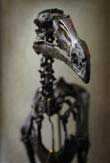 Scientists have uncovered the “beautifully preserved” bones of approximately 20 dodo birds (a species of flightless bird that is now extinct) in a dig site on the island nation of Mauritius in the Indian Ocean.
Scientists have uncovered the “beautifully preserved” bones of approximately 20 dodo birds (a species of flightless bird that is now extinct) in a dig site on the island nation of Mauritius in the Indian Ocean.
So far, very little is known about this bird—a famous flightless species believed to have gone extinct in the 17th century.
A Dutch and Mauritian scientific team discovered the bones in a swamp area near a sugarcane plantation in the southeastern part of the island, including parts of the beak and bones of juvenile birds. They believe these remains are at least 2,000 years old and hope to gain further insights into their lives.
This discovery is considered a breakthrough in the Netherlands. “The new findings will enable the first research to reconstruct the ancient world of the dodo bird, prior to Western colonization of Mauritius and the extinction of this species,” noted the Natural History Museum of the Netherlands.
The dodo was hunted to extinction by Dutch and Portuguese colonists within just 200 years of European arrival on the island.


















































